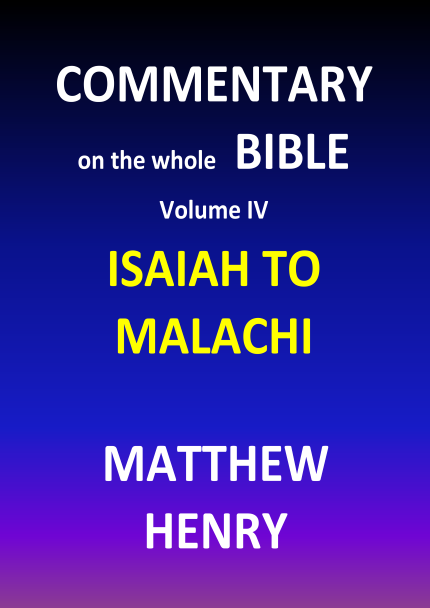Matthew Henry

Commentary on the whole Bible.
Volume IV. – From Isaiah to Malachi.
By Matthew Henry.
A Quotation from Mathew Henry:
Perhaps his best-known quotation is about the relationship between men and women, from the story of the creation of Eve, in the Book of Genesis:
The woman was made of a rib out of the side of Adam; not made out of his head to rule over him, nor out of his feet to be trampled upon by him, but out of his side to be equal with him, under his arm to be protected, and near his heart to be beloved
Matthew Henry
The Bible books covered in the fourth volume of Matthew Henry’s Bible Commentary:
Isaiah: The book of Isaiah is a collection of prophecies delivered by the prophet Isaiah, addressing the people of Judah and Jerusalem during the reigns of various kings. The book is divided into two sections: the first 39 chapters contain warnings and prophecies of judgment against Judah and other nations, while the last 27 chapters offer hope and consolation, including prophecies of the coming Messiah.
Jeremiah: Jeremiah was a prophet who served during the time of the Babylonian exile. The book of Jeremiah contains his prophecies, warnings, and lamentations, calling for Judah to repent and turn back to God before it’s too late. The book also includes stories from Jeremiah’s life, including his personal struggles and experiences.
Lamentations: The book of Lamentations is a collection of five poems, expressing grief and lament over the destruction of Jerusalem and the temple. The poems also express hope and trust in God’s faithfulness and mercy.
Ezekiel: Ezekiel was a priest and prophet who was taken into Babylonian captivity along with King Jehoiachin. The book of Ezekiel contains his prophecies and visions, including messages of judgment against Judah and other nations, as well as prophecies of restoration and hope for God’s people.
Daniel: The book of Daniel tells the story of the prophet Daniel, who was taken into Babylonian captivity along with other Jews. The book includes stories of Daniel’s faithfulness and obedience to God, as well as his visions and prophecies, including the famous prophecy of the “70 weeks”.
Hosea: Hosea was a prophet who lived during the reigns of several kings of Israel. The book of Hosea contains his prophecies and messages of warning, calling for Israel to turn back to God and warning of the consequences of their disobedience. The book also includes Hosea’s personal story of redemption, as he marries an unfaithful woman as a symbol of God’s love for his unfaithful people.
Joel: Joel was a prophet who addressed the people of Judah during a time of great suffering and hardship, including drought and plague. The book of Joel contains his prophecies, including warnings of judgment and calls for repentance, as well as messages of hope and restoration.
Amos: Amos was a prophet who spoke out against the social injustices and moral decay of Israel during the reign of King Jeroboam II. The book of Amos contains his prophecies and messages of warning, including the famous words “let justice roll down like waters, and righteousness like an ever-flowing stream”.
Obadiah: The book of Obadiah is the shortest book in the Old Testament, containing just one chapter. It is a prophecy against the nation of Edom, which had mistreated the people of Judah during their time of need.
Jonah: The book of Jonah tells the story of the prophet Jonah, who was sent by God to preach a message of repentance to the city of Nineveh. Jonah initially resists God’s call and attempts to flee, but ultimately obeys and witnesses the city’s repentance.
Micah: Micah was a prophet who addressed the people of Judah during a time of political and social turmoil, including corruption and idolatry. The book of Micah contains his prophecies and messages of warning, as well as messages of hope and restoration.
Nahum: The book of Nahum is a prophecy against the city of Nineveh, predicting its downfall and destruction.
Habakkuk: The book of Habakkuk consists of a dialogue between the prophet and God regarding the problems of injustice and evil in Judah. Habakkuk questions God’s justice, and God responds by revealing His plan to use the Babylonians as an instrument of judgment against Judah.
Zephaniah: The book of Zephaniah contains prophecies of judgment against Judah, its neighbors, and the nations of the world. The book warns of impending destruction and calls for repentance.
Haggai: The book of Haggai contains four prophetic messages given to the Jews who had returned from exile in Babylon. Haggai encourages the people to rebuild the temple, promising them that God’s blessing will be upon them if they obey.
Zechariah: The book of Zechariah contains visions and prophecies regarding the rebuilding of the temple and the coming of the Messiah. The book also contains messages of hope and encouragement for the people of Israel.
Malachi: The book of Malachi contains a series of messages from God to the people of Israel, focusing on their unfaithfulness and the need for repentance. The book also contains prophecies regarding the coming of the Messiah and the judgment that will come upon the wicked.